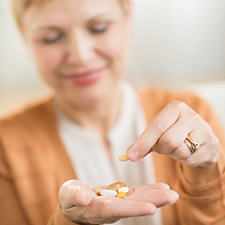Do Seniors Need Special Vitamins?
I see vitamins designated as "platinum" or "silver" for those over a certain age. Why is this? Do we need different nutrients as we get older? Are the doses higher in these formulas for seniors?
Andrew Weil, M.D. | August 19, 2014

As we get older, we don’t need different nutrients as much as we may need different dosages to compensate for some of the age-related changes in our bodies. I discussed your question with Tierarona Low Dog, M.D., chief medical officer of Weil Lifestyle and an internationally known expert on herbal medicine, dietary supplements and women’s health. She notes that as we get older, our skin is less able to synthesize vitamin D, and we also may spend more time indoors. As a result, we may not get enough sun exposure to trigger synthesis of vitamin D, which assists in the absorption of calcium and promotes bone mineralization. This deficiency may in turn contribute to the progression of osteoporosis. Vitamin D also helps strengthen the immune system and protect against a number of serious diseases, including hypertension, psoriasis, and autoimmune disorders (including multiple sclerosis and rheumatoid arthritis). In addition, growing evidence has demonstrated its important role in defending against cancer. (Studies link a deficiency of vitamin D to as many as 18 different cancers.)
Another vitamin seniors may not absorb as readily as they once did is vitamin B12. The problem here is that we need stomach acid for optimal absorption of B12, but as we age, our bodies often produce less of it. In addition, if you suffer from heartburn or acid reflux, you may be taking over-the-counter or prescription drugs called proton-pump inhibitors (PPIs) or histamine-2 receptor antagonists (H2RAs). These work by inhibiting stomach acid production, raising the risk of vitamin B12 deficiency. A study published in the December 11, 2013 issue of the Journal of the American Medical Association (JAMA) showed that taking PPIs for more than two years increases the risk of deficiency by 65 percent, while taking H2RAs boosted the risk by 25 percent.
After menopause, as estrogen levels fall, so does a woman’s ability to absorb calcium. I recommend that women supplement with 500 to 700 mg of calcium citrate in two divided doses taken with meals for a total of 1,000 to 1,200 mg a day from all sources (including diet). I do not recommend calcium supplements for men (except on the advice of a physician). Instead, I suggest that men try to get 500 to 600 mg of calcium daily through their diets.
Dr. Low Dog adds that as women move beyond menstruation, they should not take supplemental iron unless instructed to by a health care provider, as some people have a genetic trait that makes them store iron excessively. Some research suggests that high iron levels may increase the risk of certain cancers.
Dr. Low Dog and I agree that throughout life you should always try to get most of the nutrients you need from your diet, but as we get older that may not be as easy as it once was. For that reason, you may need supplements designed to address the potential deficiencies discussed above.
Andrew Weil, M.D.









